The Mystery Of Life
November 2022
Shindig Magazine
|
Thanks to Lyndy C. for sharing this article.
|
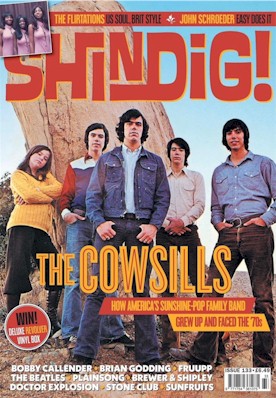
Cover
|
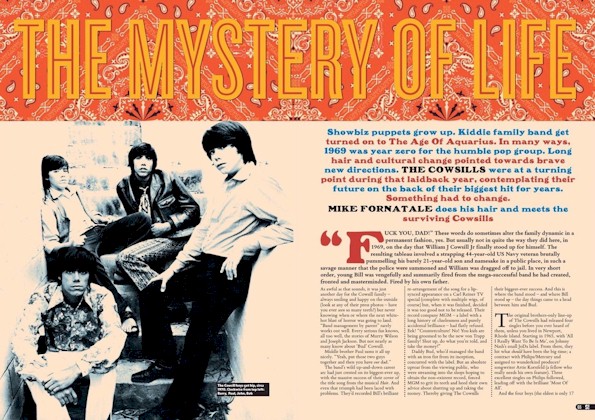
The Mystery Of Life
|
|
Showbiz puppets grow up. Kiddie family band get turned on to The Age Of Aquarius. In many ways, 1969 was a year zero for the humble pop group. Long hair and cultural change pointed toward brave new directions. THE COWSILLS were at a turning point during that laidback year, comtemplating their future on the back of their biggest hit for years. Something had to change. MIKE FONTALALE does his hair and meets the surviving Cowsills.
"F*** You, Dad!" These words do something alter the family dynamic in a permanent fashion, yes. But usually not in quite the way they did here, in 1969, on the day that William J Cowsill Jr finally stood up for himself. The resulting tableau involved a strapping 44-year-old US Navy veteran brutally pummeling his barely 21-year-old son and namesake in a public place, in such a savage manner that the police were summoned and William was dragged off to jail. In very short order, young Bill was vengefully and summarily fired from the mega-successful band he had created, fronted and masterminded. Fired by his own father.
As awful as that sounds, it was just another day for the Cowsill family - always smiling and happy on the outside (look at any of their press photos - have you ever seen so many teeth?) but never knowing when or where the next white-hot blast of horror was going to land. "Band management by parent" rarely works out well. Every serious fan knows, all too well, the stories of Murry Wilson and Joseph Jackson. But not nearly as many know about 'Bud' Cowsill.
Middle brother Paul sums it all up nicely. "Yeah, put those two guys together and then you have our dad. . . "
The band's wild up-and-down career arc had just crested on its biggest-ever up, with the massive success of their cover of the title song from the musical Hair. And even that triumph had been laced with problems. They'd recorded Bill's brilliant re-arrangement of the song for a lipsynced appearance on a Carl Reiner TV special (complete with multiple wigs, of course) but, when it was finished, decided it was too good not to be released. Their record company MGM - a label with a long history of cluelessness and purely accidental brilliance - had flatly refused. Eek! "Counterculture! No! You kids are being groomed to be the new von Trapp family! Shut up, do what you'd told, and take the money!"
Daddy Bud, who'd managed the band with an iron fist from its inception, concurred with the label. But an absolute uproar from the viewing public, who were streaming into the shops hoping to obtain the non-existent record, forced MGM to girt its teeth and heed their ow advice about shutting up and taking the money. Thereby giving The
Cowsills their biggest-ever success. And this is where the band stood - and where Bill stood up - the day things came to a head between him and Bud.
The original brothers-only line-up of The Cowsills had released four singles before you ever heard of them, unless you lived in Newport, Rhode Island. Starting in 1965, with 'All I Really Want To be Is Me', on Johnny Nash's small JoDa label. From there, they hit what should have been the big time; a contract with Philips/Mercury and assigned to wunderkind producer / songwriter Artie Kornfeld (a fellow who really needs his own feature). Three excellent singles on Philips followed, leading off with the brilliant 'Most of All'.
And the four boys (the eldest is only 17 . . . let not one but two future legends walk out the building. "We had four our George Martin," affirms Bob. "And when we got dropped, he came with us."
|
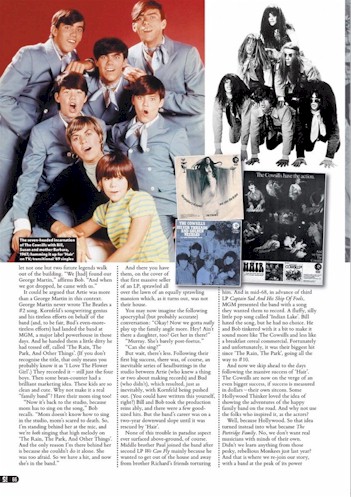
|
|
It could be argued that Artie was more than a George Martin in this context. George Martin never wrote The Beatles a #2 song. Kornfeld's songwriting genius and his tireless efforts on behalf of the band (and, to be fair, Bud's even-more-tireless efforts) had landed the band at MGM, a major label powerhouse in those days. And he handed them a little ditty he had tossed off, called 'The Rain, The Park, And Other Things'. (If you don't recognize the title that only means you probably know it as 'I Love The Flower Girl'.) They recorded it - still just the four boys. Then some bean-counter had a brilliant marketing idea. These kids are so clean and cute. Why not make it a real "family band"? Have their mom sing too!
"Now it's back to the studio, because mom has to sing on the song," Bob recalls. "Mom doesn't know how to sing in the studio, mom's scared to death. So, I'm standing behind her at the mic, and we're both singing that high melody on 'The Rain, The Park, And Other Things'. And the only reason I'm there behind her is because she couldn't do it alone. She was too afraid. So we have a hit, and now she's in the band."
And there you have them, on the cover of that first massive seller of an LP, sprawled all over the lawn of an equally sprawling mansion which, as it turns out, was not their house.
You may now imagine the following apocryphal (but probably accurate) conversation: "Okay! Now we gotta really play up the family angle more. Hey! Ain't there a daughter, too? Get her in there!"
"Murray. She's barely post-foetus."
"Can she sing?"
But wait, there's less. Following their first big success, there was, of course, an inevitable series of headbuttings in the studio between Artie (who knew a thing or two about making records) and Bud (who didn't), which resulted, just as inevitably, with Kornfeld being pushed out. (You could have written this yourself, right?) Bill and Bob took the production reins ably, and there were a few good-sized hits. But the band's career was on a two-year downward slope until it was rescued by 'Hair'.
None of this trouble in paradise aspect ever surfaced above-ground, of course. Middle brother Paul joined the band after second LP We Can Fly mainly because he wanted to get out of the house and away from brother Richard's friends torturing him. And in mid-68, in advance of third LP Captain Sad And His Ship Of Fools, MGM presented the band with a song they wanted them to record. A fluffy, silly little pop song called 'Indian Lake'. Bill hated the song, but he had no choice. He and Bob tinkered with it a bit to make it sound more like The Cowsills and less like a breakfast cereal commercial. Fortunately and unfortunately, it was their biggest hit since 'The Rain, The Park', going all the way to #10.
And now we skip ahead to the days following the massive success of 'Hair'. The Cowsills are now on the verge of an even bigger success, if success is measured in dollars - their own sitcom. Some Hollywood Thinker loved the idea of showing the adventures of the happy family band on the road. And why not use the folks who inspired it, as the actors?
Well, because Hollywood. So that idea turned instead into what became The Partridge Family. No, we don't want real musicians with minds of their own. Didn't we learn anything from those pesky, rebellious Monkees just last year? And that is where we re-join our story, with a band at the peak of its power suddenly cut off at the knees. At least Brian Wilson was eventually able to fire his father, instead of the other way around.
|
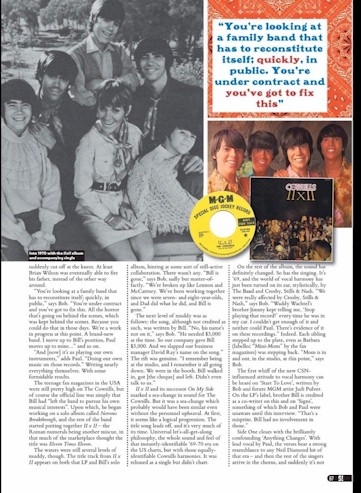
|
|
"You're looking at a family band that has no reconstitute itself; quickly, in public," says Bob. "You're under contract and you've got to fix this. All the horror that's going on behind the scenes, which was kept behind the scenes. Because you could do that in those days. We're a work in progress at this point. A brand-new band. I moved up to Bill's position, Paul moves up to mine. . ." and so on.
"And [now] it's us playing our own instruments," adds Paul. "Doing our own music on those records." Writing nearly everthing themselves. With some formidable results.
The teenage fan magazines in the USA were still pretty high on The Cowsills, but of course the official line was simply that Bill had "left the band to pursue his own musical interests”. Upon which, he began working on a solo album called Nervous Breakthrough, and the rest of the band started putting together II x II - the Roman numerals being another miscue, in that much of the marketplace thought that title was Eleven Times Eleven .
The waters were still several levels of muddy, though. The title track from from II x II spears on both that LP and Bill's solo album, hinting at some sort of still-active collaboration. There wasn't any. "Bill is gone," says Bob, sadly but matter-of-factly. "We're broken up like Lennon and McCartney. We've been working together since we were sever-and eight-years olds, and Dad did what he did, and Bill is gone."
The next level of muddy was as follows: the song, although not credited as such, was written by Bill. "No, his name's not on it," says Bob. "He needed $3,000 at the time. So our company gave Bill $3,000. And we slapped our business manager David Ray's name on the song." The rift was genuine. "I remember being at the studio and I remember it all going down. We were in the booth. Bill walked in, got [the cheque] and left. Didn't even talk to us."
II x II and its successor On My Side marked a sea-change in sound for The Cowsills. But it was a sea-change which probably would have been similar even without the personnel upheaval. At first, it seems like a logical progression. The title song leads off, and it's very much of its time. Universal let's-all-get-along philosophy, the whole sound and feel of that instantly-identifiable '69-70 era on the US charts, but with those equally-identifiable Cowsill harmonies. It was released as a single but didn't chart.
On the rest of the album, the sound has definitely changed. So has the singing. It's '69 and the world of vocal harmony has just been turned on its ear, stylistically, by The Band and Crosby, Stills & Nash. "We were really affected by Crosby, Stills & Nash," says Bob. "Waddy Wachtel's brother Jimmy kept telling me, 'Stop playing that record!' every time he was in my car. I couldn't get enough of it and neither could Paul. There's evidence of it on these recordings." Indeed. Each sibling stepped up to the plate, even as Barbara (labelled "Mini-Mom" by the fan magazines) was stepping back. "Mom is in and out, in the studio, at this point," says Bob.
The first whiff of the new CSN-influenced attitude to vocal harmony can be heard on 'Start To Love', written by Bob and future MGM artist Judi Pulver. On the LP's label, brother Bill is credited as a co-writer on this and on 'Signs', something of which Bob and Paul were unaware until this interview. "That's a misprint. Bill had no involvement in those."
Side one closes with the brilliantly confounding 'Anything Changes'. With lead vocal by Paul, the verses bear a strong resemblance to any Neil Diamond hit of that era - and then the rest of the singers arrive in the chorus, and suddenly it's not only Crosby, Stills & Nash, but also Young. With the '71 line-up of Yes (good trick, too, since they're still a year away) providing the backing. They lyrics were inspired by the recent moon landing. "That was me and Paul," remembers Bob. "When Neil Armstrong stepped on the moon we just thought, 'Oh, well, there goes outer space. It's just a matter of time'."
|
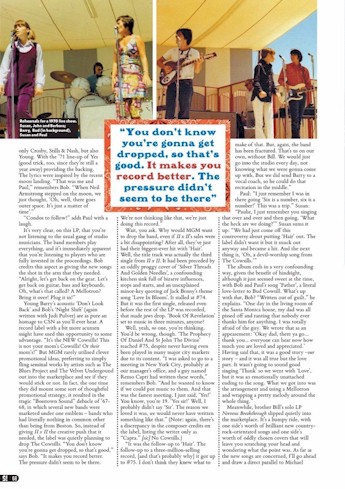
|
|
"Condos to follow!" adds Paul with a laugh.
It's very clear, on this LP that you're not listening to the usual gang of studio musicians. The band members play everything, and it's immediately apparent that you're listening to players who are fully invested in the proceedings. Bob credits this aspect as giving the new songs the shot in the arm that they needed. "Alright, let's get back on the gear. Let's get back on guitar, bass and keyboards. Oh, what's that called? A Mellotron? Bring it over! Plug it in!"
Young Barry's acoustic 'Don't Look Back' and Bob's 'Night Shift' (again written with Judi Pulver) are as pure an homage to CDN s you'll ever hear. A record label with a bit more acumen might have used this opportunity to some advantage. "It's the NEW Cowsills! This is not your mom's Cowsills! Or their mom's!" But MGM rarely utilized clever promotional ideas, preferring to simply fling seminal works by artists such as The Blues Project and The Velvet Underground out into the marketplace and see if they would stick or not. If fact, the one time they did mount some sort of thoughtful promotional strategy, it resulted in the tragic "Bosstown Sound" debacle of '67-68, in which several new bands were marketed under one emblem - bands who had literally nothing in common other than being from Boston. So, instead of giving II x II the creative push that it needed, the label was quietly planning to drop The Cowsills. "You don't know you're gonna get drooped, so that's good," says Bob. "It makes you record better. The pressure didn't seem to be there. We're not thinking like that, we're just doing this record."
Wait, you ask. Why would MGM want to drop the band, even if II x II sales were a bit disappointing? After all, they've just had their biggest-ever hit with 'Hair'. Well, the title track was actually the third single from II x II. It had been preceded by an oddly proggy cover of 'Silver Threads And Golden Needles', a confounding kitchen sink full of bizarre influences, stops and starts, and an unexplained minor-key quoting of Jack Benny's theme song 'Love In Bloom'. It stalled at #74. But it was the first single, released even before the rest of the LP was recorded, that made jaws drop. 'Book Of Revelation' set to music in three minutes, anyone?
Well, yeah, no one, you're thinking. You'd be wrong, though. 'The Prophecy Of Daniel And St John The Divine' reached #75, despite never having even been played in many major city markets due to its content. "I was asked to go to a meeting in New York City, probably at our manager's office, and a guy named Remo Capri had written these words," remembers Bob. "And he wanted to know if we could put music to them. And that was the fastest meeting. I just said, 'Yes!' You know, you're 19. 'Yes sir!' Well, I probably didn't say 'Sir'. The reasons we loved it was, we would never have written something like that." (Note: again, there's a discrepancy in the composer credits on the label, listing the writer only as "Capra." [sic] No Cowsills.)
"It was the follow-up to 'Hair'. The follow-up to a three-million-selling record, [and that's probably why] it got up to #75. I don't think they knew what to make of that. But, again, the band has been fractured. That's us on our own, without Bill. We would just go into the studio every day, not knowing what we were gonna come up with. But we did send Barry to a vocal coach, so he could do that recitation in the middle."
Paul: "I just remember I was in there going 'Six is a number, six is a number!' This was a trip." Susan: "Paulie, I just remember you singing that over and over and then going, 'What the heck are we doing?' " Susan sums it up: "We had just come off this controversy about putting 'Hair' out. The label didn't want it but it snuck out anyway and became a hit. And the next thing is, 'Oh, a devil-worship song for The Cowsills.' "
The album ends in a very confounding way, given the benefit of hindsight, although it just seemed sweet at the time, with Bob and Paul's song 'Father', a literal lover-letter to Bud Cowsill. What's up with that, Bob? "Written out of guilt," he explains. "One day in the living room of the Santa Monica house, my dad was all pissed off and ranting that nobody ever thanks him for anything. I was totally afraid of the guy. We wrote that as an appeasement: 'Okay dad, there ya go . . . thank you . . . everyone can hear now how much you are loved and appreciated.' Having said that, it was a good story - our story - and it was all true but the love part. It wasn't going to sound good singing 'Thank' so we went with 'Love', but it was an emotionally unattached ending to the song. What we got into was the arrangement and using a Mellotron and wrapping a pretty melody around the whole thing."
Meanwhile, brother Bill's solo LP Nervous Breakthrough slipped quietly into the marketplace. It's a bumpy ride, with one side's worth of brilliant new country-rock-orientated songs and one side's worth of oddly chosen covers that will leave you scratching your head and wondering what the point was. As far as the new songs are concerned, I'll go ahead and draw a direct parallel to Michael Nesmith's post-Monkees work. The background vocals are very familiar sounding but uncredited, which made many of us wonder if the whole family might have been present. But no, "That's just him stacking him!" laughs Susan. "Every Cowsill who does all their own harmonies, on their own project, just sounds like 'The gang.' You stack your own vocals, and then [you realise ] 'That sounds like us!' " Bob elaborates. "It's the DNA component. If you give Paul, me, and Susan the same song and put us in separate rooms, the arrangements are gonna come back with a lot of overlap. It's just gonna be that way. It's always been that way."
|
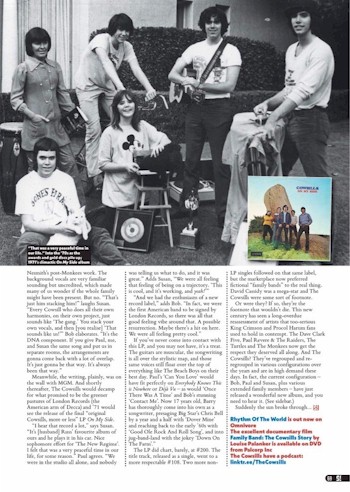
|
|
Meanwhile, the writing, plainly, was on the wall with MGM. And shortly thereafter, The Cowsills would decamp for what promised to be the greener pastures of London Records (the American arm of Decca) and '71 would see the release of the final "original Cowsill, more or less" LP On My Side .
"I hear that record a lot," says Susan. "It's [husband] Russ' favourite album of ours and he plays it in his car. Nice sophomore effort for "The New Regime". I felt that was a very peaceful time in our life, for some reason." Paul agrees. "We were in the studio all alone, and nobody was telling us what to do, and it was great." Adds Susan, "We were all feeling that feeling of being on a trajectory. 'This is cool, and it's working, and yeah!' "
If you've never come into contact with this LP, and you may not have, it's a treat. The guitars are muscular, the songwriting is all over the stylistic map, and those same voices still float over the top of everything like The Beach Boys on their best day. Paul's 'Can You Love' would have fit perfectly on Everybody Knows This is Nowhere or Deja vu - as would 'Once There Was A Time' and Bob's stunning 'Contact Me' Now 17 years old, Barry has thoroughly come into his own as a songwriter, presaging Big Star's Chris Bell by a year and a half with 'Dover Mine' and reaching back to the early '60s with 'Good Ole Rock and Roll Song', and into jug-band-land with the jokey 'Down On The Farm'."
The LP did chart, barely, at #200. The title track, released as a single, went to a more respectable #108. Two more non-LP singles followed on the same label, but the marketplace now preferred fictional "family bands" to the real thing. David Cassidy was a mega-star and The Cowsills were some sort of footnote.
Or were they? If so, they're the footnote that wouldn't die. This new century has seen a long-overdue reassessment of artists that too-serious King Crimson and Procol Harum fans used to hold in contemp. The Dave Clark Five, Paul Revere & The Raiders, The Turtles and The Monkees now get the respect they deserved all along. And The Cowsills? They've regrouped and re-regrouped in various configurations over the years and are in high demand these days. In fact, the current configuration - Bob, Paul and Susan, plus various extended family members + have just release a wonderful new album, and you need to hear it. (See sidebar.)
|
Under The Radar
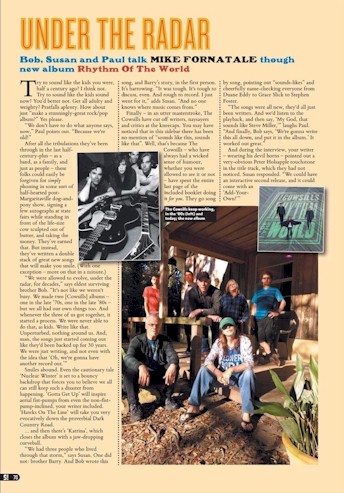
|
|
Under The Radar
Bob, Susan and Paul talk Mike Fornatale though new album Rhythm Of The World
Try to sound like the kids you were, half a century ago? I think not. Try to sound like the kids sound now? You'd better not. Get all adulty and weighty? Pratfalls aplenty. How about just "make a stunningly-great rock/pop album?" Yes please.
"We don't have to do what anyone says, now," Paul points out. "Because we're old!"
After all the tribulations they've been through in the last half-century-plus - as a band, as a family, and just as people - these folks could easily be forgiven for simply phoning in some sort of half-hearted post-Margaritaville dog-and-pony show, signing a few autographs at state fairs while standing in front of a life-size cow sculptured out of butter, and taking the money. They've earned that. But instead, they've written a double stack of great new songs that will make you smile. (With one exception - more on that in a minute.)
"We were allowed to evolve, under the radar, for decades," says eldest surviving brother Bob. "It's not like we weren't busy. We made two [Cowsills] albums - one in the late '70s, one in the late '80s - but we all had our own things too. And whenever the three of us got together, it started a process. We were never able to do that, as kids. Write like that. Unperturbed, nothing around us. And, man, the songs just started coming out like they'd been backed up fr 30 years. We were just writing, and not even with the idea that 'Oh, we're gonna have another record out.' "
Smiles abound. Even the cautionary tale 'Nuclear Winter' is set to a bouncy backdrop that forces you to believe we all can still keep such a disaster from happening. 'Gotta Get Up' will inspire aerial fist-pumps from even the non-fist-pump-inclined, your writer included. 'Hawks On The Line' will take you ever evocatively down the proverbial Dark County Road.
. . . and then there's 'Katrina', which closes the album with a jaw-dropping curveball.
"We had three people who lived through that storm," says Susan. One did not: brother Barry. And Bob wrote this song, and Barry's story, in the first person. It's harrowing. "It was tough. It's tough to discuss, even. And rough to record. I just went for it," adds Susan. "And no one knows where music comes from."
Finally - in an utter masterstroke, The Cowsills have cut off writers, naysayers and critics at the kneecaps. You may have noticed that in this sidebar there has been no mention of "sounds like this, sounds like that". Well, that's because The Cowsills - who have always had a wicked sense of humour whether you were allowed to see it or not - have spent the entire last page of the included booklet doing it for you. The go song by song, pointing out "sounds-likes" and Cheerfully name-checking everyone from Duane Eddy to Grace Slick to Stephen Foster.
"The songs were all new, they'd all just been written. And we'd listen to the playback, and then say, 'My God, that sounds like Steve Miller,' "laughs Paul."
And finally, Bob says, 'We're gonna write this all down, and put it in the album.' It worked out great."
And during the interview, your writer - wearing his devil horns - pointed out a very-obvious Peter Holsapple touchstone in the title track, which they had not noticed. Susan responded. "We can have an interactive second release, and it could come with an 'Add-Your-Own!' "
|
Ad
|











